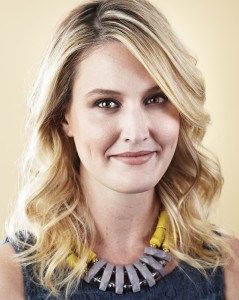The Other Typist by Suzanne Rindell (Amy Einhorn Books/Putnam; 368 pages; $25.95).
If Gillian Flynn’s Gone Girl was THE mystery of 2012, then Suzanne Rindell’s The Other Typist is THE mystery of 2013. Suzanne kindly answered some questions I posed to her via email. I’m very excited to share her Q&A with you today.
“They said the typewriter would unsex us,” Suzanne Rindell writes in her dark and arresting debut The Other Typist.
Thanks, Suzanne, for letting me ask you some questions about your riveting and suspenseful psychological thriller The Other Typist. How did you get the idea for the book?
I was a grad student, specializing in 1920s literature and culture, when I came across the obituary of a woman who had worked as a typist in a police precinct during the Prohibition era. I became sort of obsessed with imagining what her life might’ve been like; what sorts of things she might’ve seen at the precinct and what sorts of reports she might’ve typed up, etc. I found myself wondering what would’ve happened if she ever deviated from the truth in the course of doing her job, and the plot for my novel was born.
Which character did you visualize or hear first? And in what way?
Definitely Rose. She was my narrator and I started hearing her voice telling a story in my head. I was only a page or so into things when I realized she wasn’t telling a straight story, and she might be somewhat emotionally damaged and unreliable.
What about an unreliable narrator appeals to you?
I have no idea. I’ve always admired the great unreliable narrators — like Humbert Humbert in Lolita — but I didn’t know I was writing one until Rose got going and I realized that even I didn’t totally take her at her word. It’s quite strange, to tell the truth.
Why did you choose to set your story in 1920s New York City?
I find New York very inspirational. It’s a character in its own right, evidenced by many more books, shows, plays, and movies than my novel. The 1920s was a natural fit for me because I was immersed in research on the era for my dissertation. I wanted to live in Fitzgerald’s New York, if only temporarily and in my imagination.
How different were earlier versions of TheOther Typist compared to the final, published version?
Some of the middle stuff shifted during editing. But the beginning point — Rose’s voice that drives that first chapter — and the final scene (which I won’t describe for fear of plot spoilers) were always the same. It was a question of arriving from one point to the next properly.
How did you manage to hold back so effectively, revealing the truth only subtly and slowly?
Unlike other mysteries, this is a story that hints at its conclusion from the start. I wasn’t out to surprise people with the plot twists as much as I was out to surprise them with the moral evolution of one particular narrator. I think you know very early on how messed up Rose is, and what a predicament she’s gotten herself into… the big reveal is why and how. As I wrote I felt a sense of gravity developing in Rose’s life. Her end was inevitable.
When you were writing this story, did you have any idea the effect it would have on readers? Did you have any notion at all how big this story was going to be?
Not truly. I think when you write you have a sense of being alone. You live in your imagination and if you like the story you’re telling — no matter how dark — you enjoy going there. The process of writing this book was really an escape for me.
Congratulations are in order! Keira Knightley is to star and take a producer’s role in a film version of your novel. Your readers are so excited. When and how did you first hear the news? What will it be like to see your story on the big screen? What do you think Knightley will bring to the character she plays? Do you know who she will play?
I’m very excited about this. I heard the news from my agent and from my film agent at CAA. Ms. Knightley has opted for some very impressive projects in the past and I’m honored she is interested in The Other Typist. The rest — how long things will take, which character she will play, etc — is in the hands of Hollywood, which is mysterious to me but which I will watch for with relish.
What’s next for you, Suzanne? Are you working on anything new?
I’m finishing up a second novel! It’s set in 1950s New York, and has to do with the publishing scene and the Greenwich Village beatniks of that era. I guess it’s a kind of second love-letter to New York. I’m having fun with it.
Thanks for a wonderful interview, Suzanne, and good luck!
Suzanne Rindell is a doctoral student in American modernist literature at Rice University. The Other Typist is her first novel. She lives in New York City and is currently working on a second novel.





I know I’m going to love this one…one of my favorite time periods and places 🙂
It’s just as good as Gone Girl. Can’t wait to hear what you think.